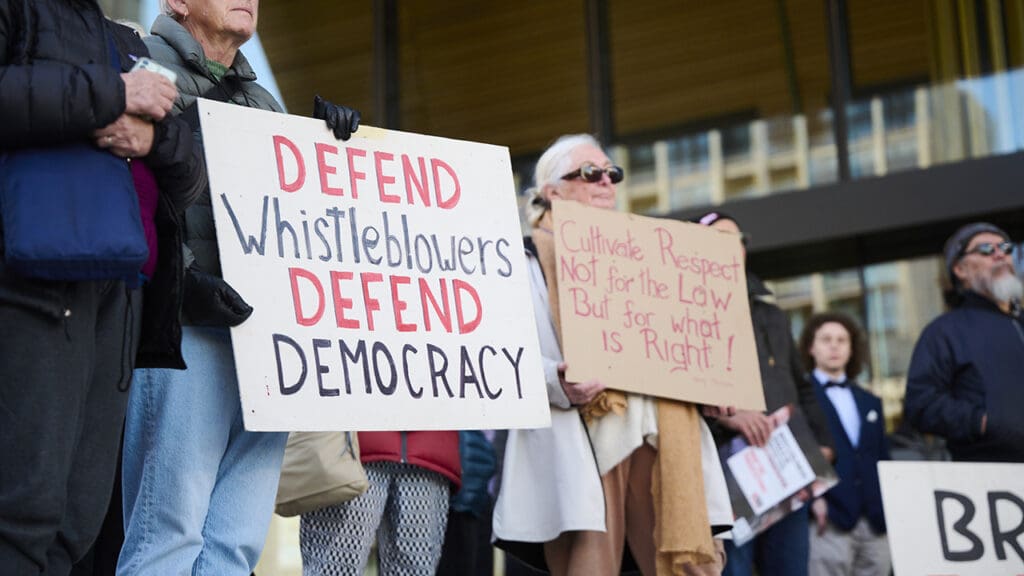We must protect whistleblowers, not punish them
OPINION | This piece was originally published by Crikey.
It is this observation that led every Australian jurisdiction to introduce dedicated laws over the past three decades to protect them. Today almost all Australian workers — whether they work for a federal, state or territory government or in the private sector — are covered by these laws. Unfortunately they are not working to full effect, and that is bad for our democracy.
Whistleblowing laws were enacted to do at least three things. First, empower Australians to speak up about wrongdoing they witness in the workplace by providing pathways for reporting concerns and procedures for investigation. Second, as a shield: protecting whistleblowers from retaliation by providing immunity and making it an offence to punish someone for speaking up. Finally, a sword. If a whistleblower does suffer, they can sue their employer for compensation and other remedies.
These laws aspire to principled goals of transparency and accountability, backed by practical mechanisms to protect and empower whistleblowers. Yet only a handful of whistleblowers have successfully sued under these laws, and not a single one under the Public Interest Disclosure Act, which protects federal public servants who blow the whistle.
Recently published research from Griffith University found that just 6% of whistleblowers who suffer as a result of their whistleblowing receive compensation. Whistleblowers’ experiences are “not happy ones”, an independent review commissioned by the federal government in 2016 found.
Ongoing high-profile cases underscore the shortcomings of these laws. Bernard Collaery and Witness K are alleged to have blown the whistle on Australia’s espionage for commercial gain against our friendly neighbour, Timor-Leste. But thanks to a blanket carve-out for intelligence information in the PID Act, they are entitled to no protection; Witness K pleaded guilty, Collaery is 10 rounds into a secret legal saga that has no end in sight.
Tax office whistleblower Richard Boyle and war crimes whistleblower David McBride both thought they were doing the right thing. They spoke up internally before going to the media after their concerns went unaddressed. The PID Act specifically provides for public disclosure in such circumstances — yet Boyle and McBride are both on trial.
The only people who have so far been hauled before our courts in relation to illegal spying on Timor-Leste, misconduct at the Tax Office and alleged war crimes in Afghanistan are the whistleblowers who helped expose each.
The failings of our whistleblowing laws matters because whistleblowers are a crucial safety valve. In the private sector they mitigate against corporate misconduct and mismanagement. In the public sector they protect democracy itself. Australia is a government of the people, by the people, for the people. But we rely on whistleblowers and journalists to bring attention to corruption, fraud and maladministration so we can make informed electoral choices. Without whistleblowers, our democracy suffers.
Think about this year’s biggest news stories.
A culture of harassment and abuse in Parliament House we know about because of brave individuals speaking up, among them Brittany Higgins. Although Higgins is not typically labelled a whistleblower, she would have been protected by whistleblowing law (she has alleged that it was indicated to her she would lose her job if she proceeded with a formal complaint) if not for a major loophole in the PID Act. The recent Jenkins review recommended that loophole be closed.
The alleged war crimes in Afghanistan we know about because of whistleblowers, who are expressly thanked in the Brereton report (and yet McBride remains on trial). Internationally the Pandora Papers and the Facebook Files — globally consequential investigative reporting — could only have been published because of whistleblowers.
Which is why an overhaul of Australia’s whistleblowing law is long overdue.
The PID Act for federal public servants was introduced in 2013 — it has been overtaken by amendments to the Corporations Act in 2019. While not perfect, the protections for private sector whistleblowers are significantly better than the PID Act equivalent. In other words, it is easier and safer to speak up about corporate wrongdoing than government corruption. That cannot be right.
Reform is therefore urgent. The Moss review in 2016 told the federal government this and offered a roadmap for reform. It was ignored until December last year, when the Morrison government finally, and belatedly, accepted most of its recommendations. Twelve months later, the government has given lip service to the necessary amendments, but refused to put a timeline on when they will be introduced.
Reform is, sadly, unlikely before the next election. Despite the government finding time to legislate wider surveillance powers, more draconian secrecy laws and even toy with entirely unnecessary voter ID laws, whistleblower protections remain on the backburner.
That must change. Whoever wins government at the next election must commit to whistleblowing reform before the end of 2022 and dropping the prosecutions.
Robust whistleblower laws provide critical democratic infrastructure — empowering people to speak up about wrongdoing in government and protecting them from retaliation. Whistleblowers must be protected, not punished.
Kieran Pender works in the Democratic Freedoms team at the Human Rights Law Centre. You can learn more about the team’s work here.

The Whistleblower Project turns 2!
Two years ago we launched the Whistleblower Project – Australia’s first dedicated legal service to protect and empower whistleblowers.
Read more
ADF whistleblower breaks 15-year silence on sexual abuse cover-up
Former RAAF airwoman Julia Delaforce represented by the Human Rights Law Centre, has broken her fifteen year silence on alleged wrongdoing and sexual abuse which was covered up by the Australian Defence Force.
Read more
What issue unites Coalition, Labor, Green, teal and One Nation voters? Whistleblower protections
The Albanese Government’s persecution of whistleblowers Richard Boyle and David McBride is unjust, and the public doesn’t support it. It’s time for much-needed reform.
Read more




